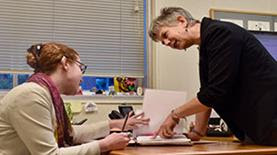Stanford law professor Juliet Brodie was appointed on April 8 as the new faculty director for the Haas Center for Public Service, succeeding education professor Deborah Stipek. Brodie directs the Stanford Community Law Clinic (CLC), where Stanford Law students are supervised in providing direct services to clients on issues including, immigration, social security and housing. Brodie also served as co-chair of the Engagement Beyond Our University group for the University’s long range planning initiative. In this role, she helped broadly assess the state of service learning at Stanford in varying departments and schools. Brodie describes herself as an “East Coast fish out of water” and Philadelphia native who understands the value of humor in difficult situations
“It’s one of the biggest markers of our shared humanity that we can laugh together, so we have a lot of fun in the Community Law Clinic, and I’m excited to have a lot of fun at the [Haas] center as well,” Brodie said.
The Daily sat down with Brodie to discuss her vision for the Haas Center and her new position.
The Stanford Daily [TSD]: After a year of racial injustice, political challenges and a global health crisis, what legacies do you envision staying with the Haas Center’s work as we come out of this pandemic?
Juliet Brodie [JB]: I think there’s a lot of energy, not just in higher education, but throughout the economy, to address some of the inequities and social catastrophes that COVID has revealed to some, although many people have known about these inequities for generations. For example, this new focus on those folks who are called essential workers — low-wage workers have been the backbone of the US economy for generations — and to see suddenly a new rhetoric of their significance to our daily lives. How can we make sure this is not just a passing phase, but that we really learned some lessons from this?
There’s nothing like a pandemic: The virus does not respect polarization, ideological divides, racial divides — we are interconnected. How we act and our other rewarding behavior is literally vital to our lives and our health. I really hope that the mission of the Haas Center, starting next year, will expand to include a principle of participation in a justice-oriented recovery from the pandemic.
I think the other catastrophe that I’m hoping we’re recovering from is this era of incredible political polarization. I’m less optimistic, because I don’t think science is going to come up with a vaccine for white supremacy, but we clearly are in a moment where we are seeing the depth of the divide, culturally and politically, in our nation. It’s not just a single divide. I think that higher education has to play a role in addressing these fissures.
TSD: How do you think Stanford service initiatives, including those run through the Haas Center, can best prevent fostering a culture of saviorism?
JB: I think of this as principled public service: The Haas Center has been a leader in service with principles. My whole career has been spent providing legal services in low-income neighborhoods that surround big universities, not only at Stanford but at other schools where I have taught. So, this question of how do we provide service with mutual respect, how can we ensure that reciprocity is the dynamic of the engagement and not, “We are here to serve you”? How does Stanford take responsibility for its impact on the region, when it comes to its carbon footprint, the housing market? We clearly are a big player that affects our neighbors, so how can we take responsibility for that, but without just writing a big check and saying we’re done? I think that the leadership of the University right now is very aligned with wanting to ensure that reciprocity and those principles imbue everything that we do in the service space. There is no other way that service can or should be done.
TSD: You have been previously involved in service education at Stanford through your involvement with the Community Law Clinic. How do you think your previous experiences with public service will influence your work at the Haas Center?
JB: I see working with Haas as a natural continuation into new space with what has been my life’s work. My whole career has been in clinical legal education, which is teaching law students how to become lawyers through the means of supervising them in real cases. I have always lived in that space where education and service meet, where we’re training people how to deliver services. My entire pedagogical approach and my investment in public service has always been through the investment into the next generations of lawyers. I’m really excited to bring those same values and approaches of public service to some of the other domains beyond the law school that the Haas Center will allow me to be involved with.
TSD: What are you most looking forward to in your new position as faculty director of the Haas Center?
JB: I’m really excited to get to know undergraduates. I have undergrad-aged children, so I love the age cohort, but I haven’t professionally worked with undergrads that much. I’m really excited to learn from the students: What does the future of public service need to look like, what should it look like, how can I help that generation explore how to make public service a meaningful part of their adulthood?
I’m also excited to learn about service learning in departments and schools other than the law school. I haven’t had the freedom to really get to know what’s happening in the engineering school, earth science, the medical school or Humanities and Sciences, in a deeper way. I’m very excited to see the opportunities in other disciplines for service learning.
This interview has been lightly edited for concision and clarity.
